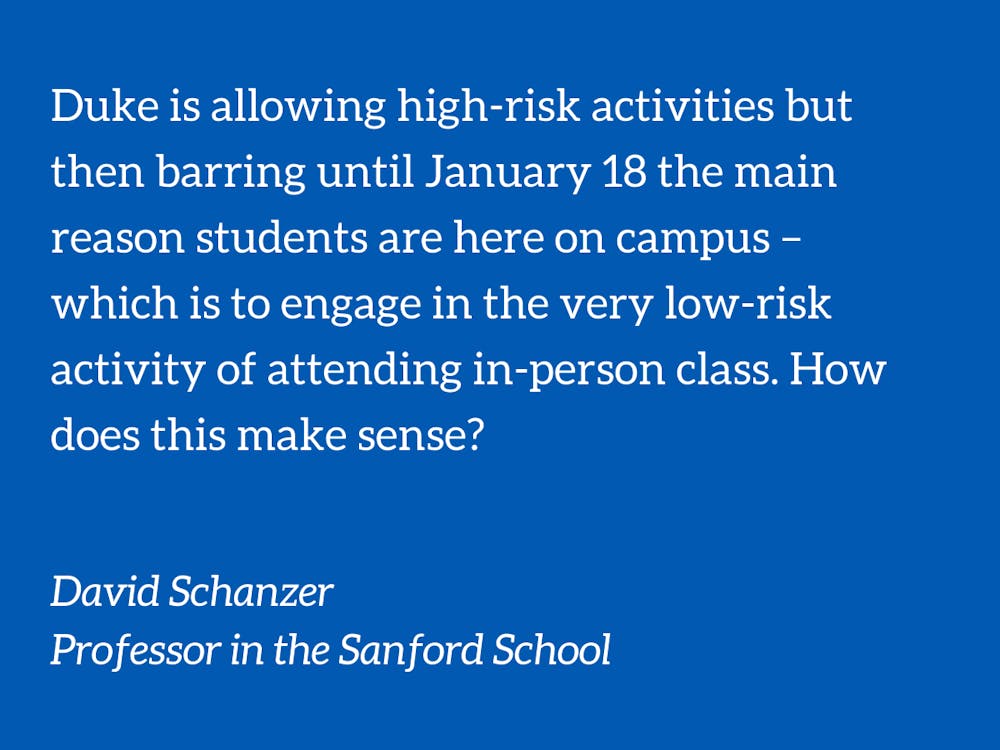Throughout this dreadful pandemic, my general approach has been to learn the science, listen to the public health officials and follow the rules laid out by policymakers at Duke who are making very tough calls under extremely trying circumstances. I don’t envy them.
But as this pandemic has unfolded, it has become more and more clear that COVID policy rules cannot be based only on maximizing public health, but rather must balance an amalgam of public interests – education, mental health, the economy and so on. So as a professor that teaches “policy analysis” – I feel at least somewhat qualified to participate in this debate as we enter the third year of the pandemic.
And my view right now is: It is time to go back to in-person classes.
Here is my reasoning.
First, from the summer of 2020, Duke experts and administrators have been telling the faculty that if everyone is masked, the risk of classroom transmission at Duke is extremely low. This was the guidance we received even BEFORE vaccines. Based on this guidance, I taught in-person in the fall of 2020 and spring of 2021.
As we moved towards full in-person classes in the fall of 2021, administrators spoke even more confidently, telling faculty that there were zero documented examples of in-class transmission at Duke. As I understand it, this conclusion was based on genomic analysis of every positive test at Duke over the past year. So confident was Duke in this principle, that even if a student in a class tested positive, other students in the classroom were not considered to have been exposed and were not subject to contact tracing. And this was occurring while the highly contagious and virulent Delta variant was ripping through North Carolina.
Second, while I accept that Duke may be assuming that the classroom risk of transmission may be greater with the Omicron variant, this does not explain Duke’s current policies. Students have been welcomed back into the dormitories where they are unmasked with their roommates and sharing bathrooms and common spaces with others. They are free to eat meals without masks in Durham restaurants. And, remarkably in my view, they are attending indoor basketball games, packed in the student section and loudly rooting for our kick-ass teams.
So, Duke is allowing high-risk activities but then barring until January 18 the main reason students are here on campus – which is to engage in the very low-risk activity of attending in-person class. How does this make sense?
Third, we now have strong evidence that Omicron will cause virtually no serious illness among the vaccinated and boosted Duke community. Duke students that get COVID will likely be either asymptomatic or have a couple days of flu-like symptoms. Of course, these students should isolate, but it is hard to understand who is being protected by preventing uninfected students from attending in-person classes?
Our comprehensive testing is doing a great deal to prevent Duke students from contributing to spread of Omicron to those who are vulnerable in the Durham community (mainly, I must point out, the voluntarily unvaccinated). If our goal is to reduce this community spread even further, then the policy should be to keep students on-campus and out of Durham bars and restaurants, not keeping them out of the classroom.
Duke has been a highly responsible Durham community member during this pandemic, but it is unclear to me why Duke students are virtually the only cohort in the community currently being required to endure lock-down like circumstances. This weekend, I ate outdoors under a heat lamp at a popular Durham restaurant. There was no vaccine mandate to eat inside, the tables and bar area were at full-capacity and precisely zero patrons were wearing masks while waiting for their food. In this permissive environment, barring triple-vaccinated, frequently-tested and masked students from attending classes together is not contributing one iota to preventing the spread of COVID to vulnerable community members.
My one idea for adjusting to life under Omicron is to up our game on masking. Until this wave is over, let’s require KN95 or N95 masks while in class or attending other in-person events (which should also resume). I would love to get my hands on a Duke-blue KN95 mask. And, of course, we should continue to accommodate faculty, staff and students who are high-risk, immunocompromised or have unvaccinated children under age 5 at home.
The only rejoinder to all this that I can think of is: “let’s exercise an excess of caution and just have on-line classes for two weeks (15% of the semester) – what is the harm?” My response is we have learned over the past two years that on-line education is a poor substitute for in-person class (and is not worth the almost $6000 students will pay to attend Duke from Jan. 5-18).
By close-of-business Tuesday, we should have identified through testing most everyone that had COVID when they arrived on campus or those who picked it up while traveling. With comprehensive testing, improved masking, and carry-out dining, we will have squeezed as much risk out of the system as possible. We must learn how to live with this virus.
Let’s go back to class.
David Schanzer is a professor in the Sanford School.
Get The Chronicle straight to your inbox
Signup for our weekly newsletter. Cancel at any time.

